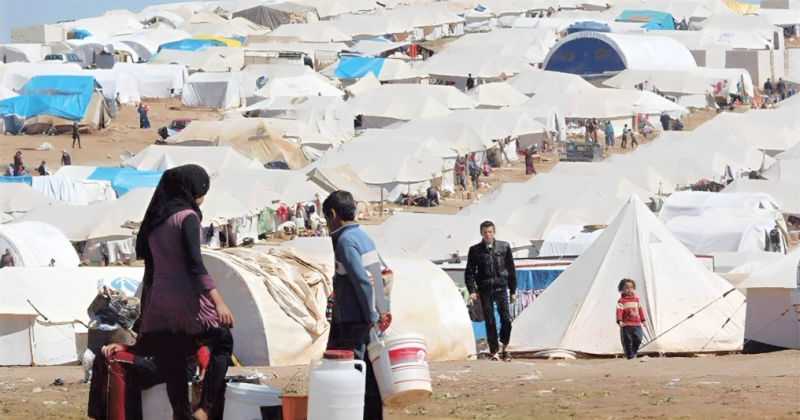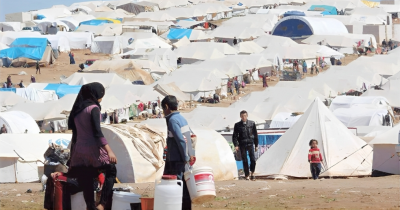A source close to Prime Minister Najib Mikati told "وردنا" that there are stricter measures concerning the issue of displacement, which include facilitating immigration.
The Lebanese-Syrian borders, which extend for 387 kilometers and include 108 checkpoints and 18 observation towers, are experiencing a renewed surge of Syrian refugees. However, the army cannot control all these points as Army Commander Joseph Aoun deems the eight thousand personnel insufficient, while groups of between 150 to 200 people are crossing through illegal crossings (137 crossings) facilitated by human smuggling gangs that operate like a coordinated spider network on both sides of the border. The Lebanese army announces daily that it has thwarted Syrians attempting to infiltrate Lebanese territory, especially at the northern and Bekaa borders.
While Lebanese authorities are trying to manage the ongoing displacement issue, international positions, particularly from the European Union, complicate matters. The EU spokesperson for the Middle East and North Africa, Luis Miguel Bueno, announced that "there is no return for Syrian refugees at the moment, and they must be assisted in Lebanon because conditions for dignified and voluntary return are not available," which raises many questions amidst reports from diplomatic sources revealing that the UNHCR currently pays monthly salaries to 850,000 registered refugees, along with generous assistance that encourages refugees to remain in Lebanon. It is also noted that the UNHCR has dealt with new waves of unregistered refugees by providing them with $10 a day, amounting to $300 monthly, which totals to $270 million monthly benefiting around 900,000 unregistered refugees. Thus, many individuals still in Syria would strive to reach Lebanon.
In any case, according to government sources for "وردنا", the issue of refugees has become a point of intersection and consensus among all Lebanese components, which will strengthen the Lebanese position in international forums after years of fragmentation and disagreement on the issue. This was clearly evident in government sessions held to discuss the matter, notably a session where the Army Commander stated that 95% of the Syrians entering Lebanon recently belong to the youth demographic, emphasizing that "cross-border smuggling has become an existential threat, and we can no longer tolerate it; we may have to confront them despite our limited numbers." In the same session, the Secretary-General of the Council of Ministers, Judge Mahmoud Makiya, proposed "declaring a state of emergency in border areas."
Thus, officials are intensifying their efforts and initiatives, demanding through international platforms and bilateral meetings that the return process be facilitated, as the consequences will be grave not only for Lebanon but also for European countries that will struggle to handle the influx of refugees. However, as the saying goes, "he who eats the sticks is not like he who counts them," especially considering that a study shows that if 10% of the approximately two million refugees are armed, meaning 40,000 individuals, then we can gauge the potential danger posed by these individuals. Security raids in some camps confirm these concerns, as weapons, surveillance equipment, cameras, as well as drugs and materials used to produce them, have been found.
In this context, the Minister of Interior and Municipalities in the caretaker government, Bassam Mawlawi, held a meeting with several governors in the presence of some mayors to follow up on the directives regarding Syrian displacement. He confirmed that "we cannot remain in a state of laxity regarding the Syrian presence in Lebanon." Meanwhile, a source close to Prime Minister Mikati told "وردنا" that the government will hold meetings in the upcoming period, where each party with details about the displacement issue will discuss them to implement more effective, advanced, and stringent measures, particularly concerning security and pursuing gangs benefitting from the smuggling of refugees.
As for European countries, it has become clear that they are unwilling to cooperate and wish to keep Syrian refugees on Lebanese territory. It is crucial to emphasize that Lebanon will not stand idly by regarding this matter. Given the risks and volatility, we are on the brink of a volcano, and security reports indicate that we are facing a serious security situation, evident in daily tensions between Lebanese and Syrians. Consequently, actions may need to be taken outside the usual context, regardless of European opinions, including facilitating immigration by sea to European shores. Finally, it should be noted that there are many unconventional plans proposed to address the Syrian displacement issue, acknowledging that communication with the Syrian side will occur for cooperation as Lebanon's interests necessitate it.
While Hezbollah Secretary-General Hassan Nasrallah discussed "a debatable idea allowing the Lebanese state to permit those refugees who wish to head to Europe, which would inevitably lead European countries to come to Beirut to ask what they can do to stop this migration, much like what Turkey did," Lebanese citizens are concerned about the spread of weapons in Syrian camps. A security source informed "وردنا" that information indicates an abundance of weapons among refugees, and the more raids there are, the more evidence of weapon presence is uncovered. The security situation is at a delicate and sensitive stage; security forces are seizing weapons from camps, but there are questions regarding some names involved.
However, there are no indications suggesting that the situation will spiral out of control. A significant question today is regarding the purpose of these weapons, especially since some of them are sophisticated and new. This indicates that while the danger was initially related to social and economic circumstances, the greatest threat currently lies within the security realm. The security source affirmed that under the prevailing living conditions, security forces are doing everything possible; however, border control remains extremely challenging amid the collapse of state components. Nonetheless, if things continue as they are, we will become unable to face any security deterioration. So far, according to data cross-checking, there are no alarming indicators, and there is a lack of regional and international desire for matters in Lebanon to devolve into complete chaos, although individual lawlessness will persist.




